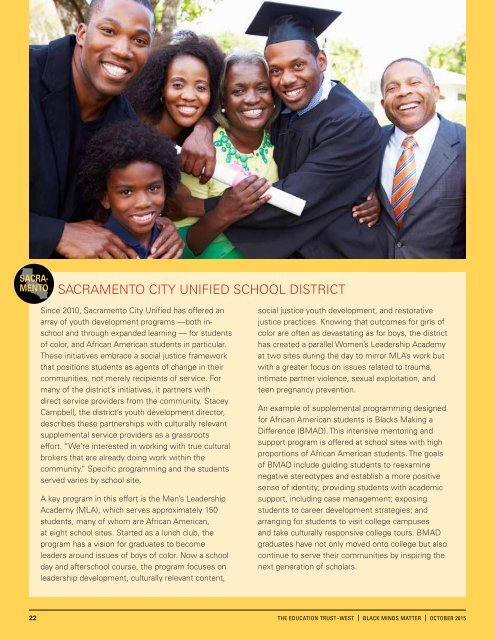MATTER
1RdiCFQ
1RdiCFQ
You also want an ePaper? Increase the reach of your titles
YUMPU automatically turns print PDFs into web optimized ePapers that Google loves.
SACRA-<br />
MENTO<br />
SACRAMENTO CITY UNIFIED SCHOOL DISTRICT<br />
Since 2010, Sacramento City Unified has offered an<br />
array of youth development programs —both inschool<br />
and through expanded learning — for students<br />
of color, and African American students in particular.<br />
These initiatives embrace a social justice framework<br />
that positions students as agents of change in their<br />
communities, not merely recipients of service. For<br />
many of the district’s initiatives, it partners with<br />
direct service providers from the community. Stacey<br />
Campbell, the district’s youth development director,<br />
describes these partnerships with culturally relevant<br />
supplemental service providers as a grassroots<br />
effort. “We’re interested in working with true cultural<br />
brokers that are already doing work within the<br />
community.” Specific programming and the students<br />
served varies by school site.<br />
A key program in this effort is the Men’s Leadership<br />
Academy (MLA), which serves approximately 150<br />
students, many of whom are African American,<br />
at eight school sites. Started as a lunch club, the<br />
program has a vision for graduates to become<br />
leaders around issues of boys of color. Now a school<br />
day and afterschool course, the program focuses on<br />
leadership development, culturally relevant content,<br />
social justice youth development, and restorative<br />
justice practices. Knowing that outcomes for girls of<br />
color are often as devastating as for boys, the district<br />
has created a parallel Women’s Leadership Academy<br />
at two sites during the day to mirror MLA’s work but<br />
with a greater focus on issues related to trauma,<br />
intimate partner violence, sexual exploitation, and<br />
teen pregnancy prevention.<br />
An example of supplemental programming designed<br />
for African American students is Blacks Making a<br />
Difference (BMAD). This intensive mentoring and<br />
support program is offered at school sites with high<br />
proportions of African American students. The goals<br />
of BMAD include guiding students to reexamine<br />
negative stereotypes and establish a more positive<br />
sense of identity; providing students with academic<br />
support, including case management; exposing<br />
students to career development strategies; and<br />
arranging for students to visit college campuses<br />
and take culturally responsive college tours. BMAD<br />
graduates have not only moved onto college but also<br />
continue to serve their communities by inspiring the<br />
next generation of scholars.<br />
22 THE EDUCATION TRUST–WEST | BLACK MINDS <strong>MATTER</strong> | OCTOBER 2015


